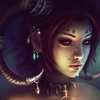Read the following excerpt from "The Brown Chest." "And this?" she went on, leaving the bed hanging in a realm of future possibility. Her headscarf had slipped back, exposing auburn hair glinting above the vapor of her breath, in evanescent present time. She had paused at the chest. Her glance darted at Gordon, and then, receiving no response, at the present owner, looking him in the eyes for the first time. The ogre smiled. "Open it." "What's in it?" she asked. He said, "I forget, actually." Delicately but fearlessly, she lifted the lid, and out swooped, with the same vividness that had astonished and alarmed his nostrils as a child, the sweetish deep cedary smell, undiminished, cedar and camphor and paper and cloth, the smell of family, family without end. Why does the narrator refer to himself as an "ogre?" What comparison can you draw between how Morna views the narrator and the old objects and how the narrator as a boy viewed similar people and objects?
Answers (1)
Know the Answer?
Not Sure About the Answer?
Find an answer to your question 👍 “Read the following excerpt from "The Brown Chest." "And this?" she went on, leaving the bed hanging in a realm of future possibility. Her ...” in 📗 English if the answers seem to be not correct or there’s no answer. Try a smart search to find answers to similar questions.
Search for Other Answers
You Might be Interested in
Which of these phrases uses symbolism? A. Though the flowers were long dead, she kept them in the vase to remember him. B. I'll spare you my woes and worries. May my burdens breathe better tomorrow. C.
Answers (2)
What poetic structures are evident in these poetry excerpts? blank valise ballad stanza Something there is that doesn't love a wall. That sends the frozen.
Answers (1)
The answer to a strong research question leads to a firm "yes" or "no" conclusion. a thesis, or topic statement. MLA or APA citations. conflicting information.
Answers (1)
Which techniques do authors use for indirect characterization
Answers (1)
Why are the animals slow to accept Animalism? A. The animals are concerned that other farmers will take them. B. The animals are skeptical of the pigs and their control. C. The animals are worried about how they will be taken care of. D.
Answers (1)
New Questions in English
In a short essay of 2-3 well-developed paragraphs, compare and contrast reading the story with watching the video. First, evaluate the choice of costumes, set, and actors in the film compared with the text version.
Answers (1)
How were Munodi's lands and home different from the others in the area? A. His were twice the size of everyone else's. C. His home was filled with art works and expensive furniture. His lands were covered with landscaped gardens. B.
Answers (1)
1. How does Johnny react when dally tells him that they beat up the socs? 2. What does Johnny say to Ponyboy before he dies? What do you think it means?
Answers (1)
The philosophical school most associated with Emerson is O A. Empiricism. O B. Transcendentalism. O C. Yale. D. Harvard
Answers (2)
Which sentence has a verb in the passive voice? A) The workers will repair our street tomorrow. B) Our neighbors demanded that someone repair our street. C) I fell off my bike when I accidentally rode it into a pothole.
Answers (1)

